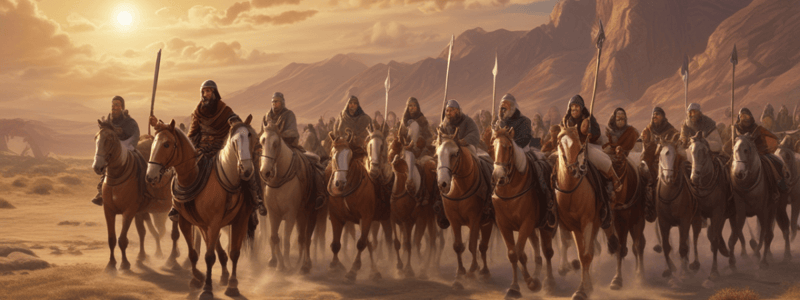Podcast
Questions and Answers
What is the primary concern of Habakkuk's first complaint in Habakkuk 1:1-11?
What is the primary concern of Habakkuk's first complaint in Habakkuk 1:1-11?
- God's silence in the face of injustice and violence (correct)
- The idolatry of the people of Judah
- The Chaldeans' evil deeds against humanity
- The psalmists' cries of distress
What is the consequence of a city built by bloodshed and conquest, according to Habakkuk 2:12-13?
What is the consequence of a city built by bloodshed and conquest, according to Habakkuk 2:12-13?
- It will be a refuge for the righteous
- It will be destroyed in the end (correct)
- It will be established forever
- It will be a symbol of God's power
What is the result of trusting in material possessions for security, according to Habakkuk 2:9?
What is the result of trusting in material possessions for security, according to Habakkuk 2:9?
- A guarantee of prosperity
- False security and potential destruction (correct)
- True security and peace
- A stronger faith in God
What is the primary theme of Habakkuk's prayer in Habakkuk 3:1-19?
What is the primary theme of Habakkuk's prayer in Habakkuk 3:1-19?
What is the consequence of idolatry, according to Habakkuk 2:18-20?
What is the consequence of idolatry, according to Habakkuk 2:18-20?
Flashcards are hidden until you start studying
Study Notes
Habakkuk's Background
- Habakkuk was one of the 12 Minor Prophets.
- His name is derived from the Hebrew verb "habad" meaning "embrace", likely meaning "one who embraces".
- He prophesied in Judah during the time of King Manasseh, around 605 B.C.
- He was a contemporary of the Prophets Nahum, Jeremiah, Daniel, and Zephaniah.
Historical Context
- The Southern Kingdom of Judah was weakening and collapsing during Habakkuk's time.
- The Babylonians (Chaldeans) were rising to power, and the Babylonian exile was imminent.
- The people of Judah were living a life of wealth and luxury, with the rich being greedy and disregarding the needs of the poor, widows, and orphans.
- The judges were corrupt, and the society was on the verge of collapse.
Themes
- Habakkuk agonizes over the wickedness and oppression in Judah, wondering why God seems to be doing nothing about it.
- He becomes confused when God reveals that the Babylonians, who are even more wicked and ruthless, will be used to judge Judah.
- In the end, Habakkuk learns to trust in the Lord and believe that God will make all things right and just in the end.
Chapters 1 & 2
- Habakkuk describes the burden he saw, lamenting the seeming silence of God in response to injustice and violence.
- God responds by saying He will rise up the Chaldeans to inflict judgment upon Judah.
- The Chaldeans will be instruments of God's wrath, but they will still answer to God for their crimes against humanity.
Chapters 3
- Habakkuk concludes his book with a beautiful psalm of praise, focusing on the person of God, the power of God, and the plan of God.
- Despite knowing the immediate future of destruction, Habakkuk finds hope in God's divine purposes and past redemptive work.
- He trusts in God's sovereignty, knowing that God will strengthen those who trust in Him and give them great confidence.
Studying That Suits You
Use AI to generate personalized quizzes and flashcards to suit your learning preferences.




